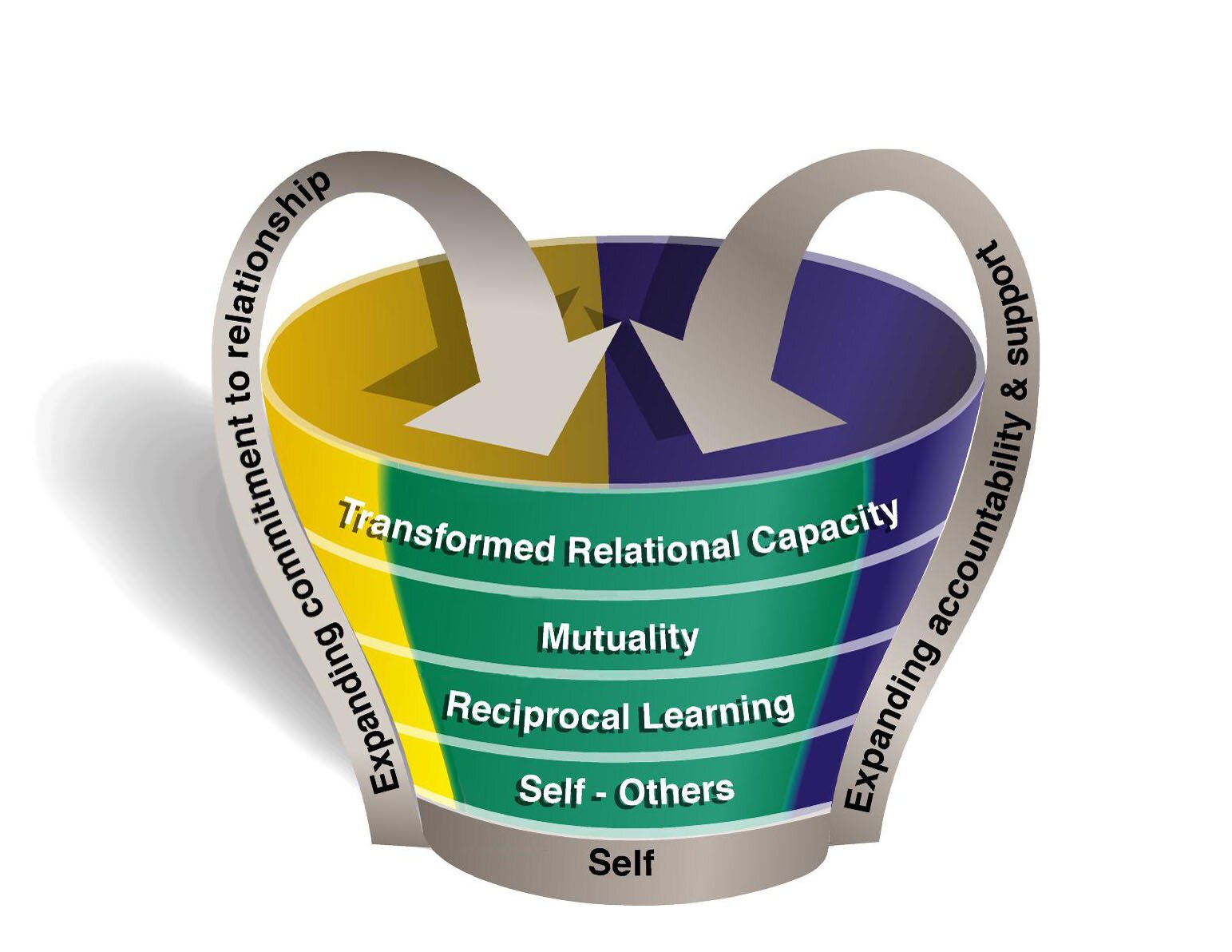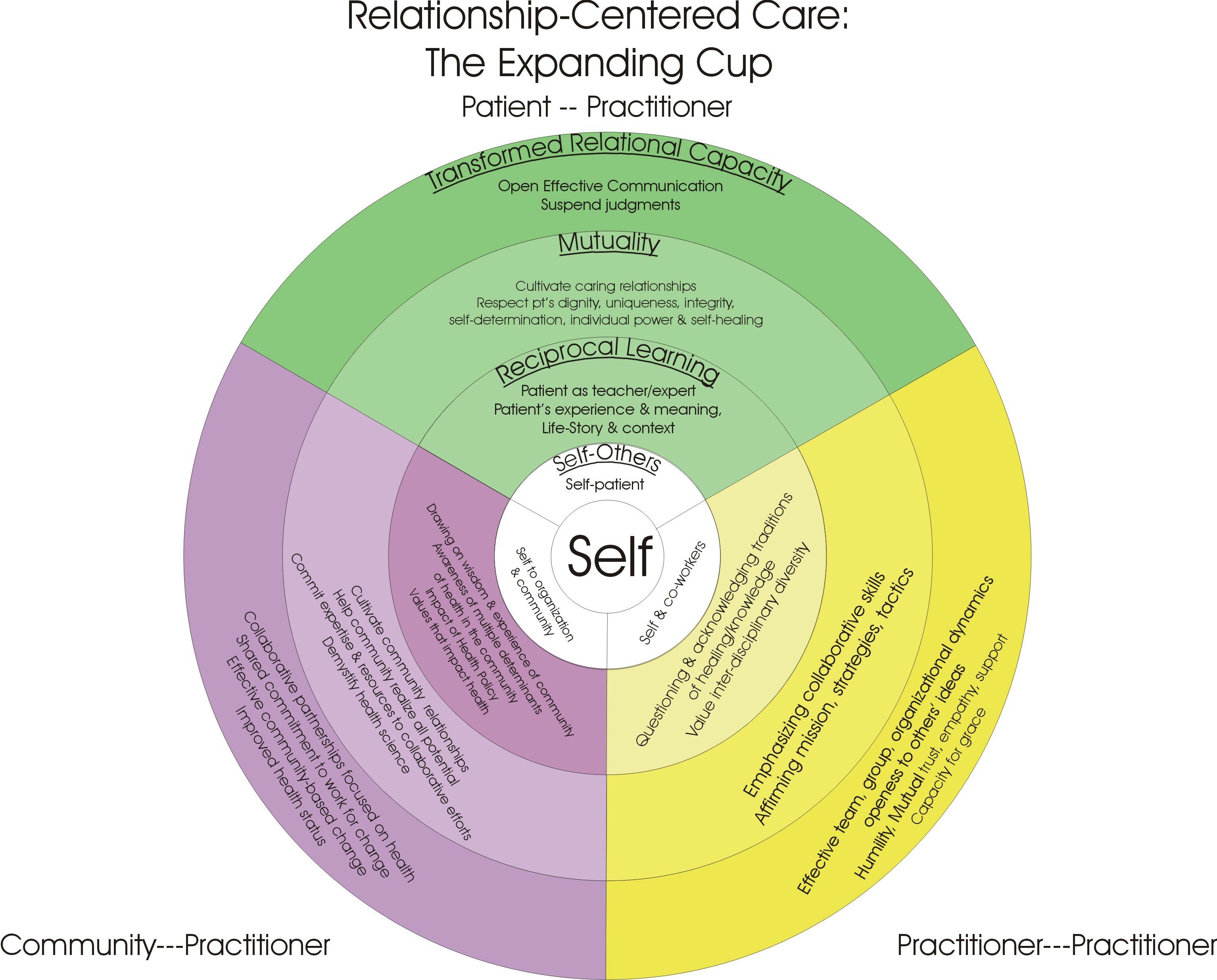rcc resources - local and global
Developed by the Relationship-Centered Care Network of Southwest Michigan


At the "heart" of the Relationship-Centered Care model is the recognition that "self matters". When individuals lost the ability to care for themselves, they are no longer able to adequately convey caring to others. The "self is defined by the cumulative experiences of one's lifetime, and must be understood in the context of an individuals' CULTURE, FAMILY, ETHNICITY, GENDER, BELIEFS and VALUES, among other variables.
Before a person can provide Self-Care, they must have a deep understanding of themselves. This Self-Understanding is gained through a lifetime of self-reflection and continuous learning, and can be obtained at an accelerated rate through the use of tools and concepts designed specifically for this purpose. A partial listing of these concepts and tools include the:
- Meyers-Briggs Character & Temperament types
- DISC Profiles
- 360-Degree Evaluations
- La Monique Empathy Scale
- Emotional Intelligence
- Five Love Languages
- Music
- Prayer
- Meditation
- Nature
- Art
- Dance
- Silence
- Exercise
- Journaling
- Reading for pleasure
- Service to others
Once "the Cup" has been adequately filled for self, it overflows onto others. It is then possible to become a "reciprocal learner" with and about someone else. Many of the same tools used for understanding self may also be used to understand others. We become the student of the other person.
As we recognize that we must be continuous learners, a model for learning like W. Edward Demming's "Theory of Profound Knowledge" may be used to help:
- facilitate an openness to learning
- teach "listening to understand"
- others' context
- others' self-understanding
- others' history
- challenge our own assumptions & stereotypes
- learn what is wanted & needed
It is implicitly understood that we must "seek first to understand" the other (Stephen Covey), and learn from their life story. We must be teachable and coach-able. We must be willing to hold ourselves accountable to the same standards or caring behaviors, including the CEO, Senior Managers, physicians and everyone throughout our organizations.
- Sharing similar experiences
- Accepting without judging
- Recognizing that things are "not good/not bad, just different"
- Listening, while allowing other to "be"
- Creating healthy bonds of connectedness
- Striving for interdependence
- Seek for Win-Win-Win solutions
- Expansion of Relationship and Connection
- Ability to Care
- Ability to Relate
- Ability to Respect
- Ability to Serve
- Ability to Listen
- Ability to Grow
- Ability to Express Love in Action
Publications on Relationship-Centered Care by Network Members
Manning-Walsh, J., Wagenfeld-Heintz, E., Asmus, A. Chambers, M., Reed, W., Wylie, J.L. (2004). "Relationship-Centered Care: The Expanding Cup Model." International Journal of Human Caring, 8:26-31.
Matthys, D. (2006). Exploring the relationship between U.K. midwives and first time mothers receiving One-to-One vs. standard midwifery care during the postnatal period. Western Michigan University, Honors thesis project.
Click here to view this document.
Wylie, J.L and Wagenfeld-Heintz, E. (2004). "Development of relationship-centered care." Journal for Healthcare Quality, 26:15-20.
Click here to view this document
Links To Other Resources
Health Professions Education and Relationship-Centered Care
Report of the Pew-Fetzer Task Force on Advancing Psychosocial Health Education (1994)
Click here to view the Pew-Fetzer Task Force Report
www.CaringMatters.com
CaringMatters is maintained by Jerry Kaiser. Another source for resources on RCC.
www.relationshipcenteredhc.com
Web site for Relationship Centered Health Care. Lots of great information on RCC organized by Anthony Suchman, Penny Williamson, and Diane Robbins.
